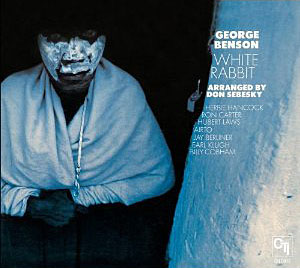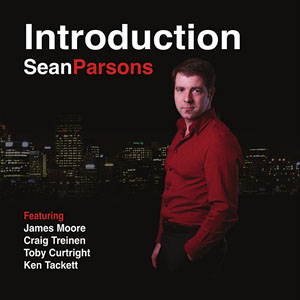Home » Jazz Articles » Multiple Reviews » The Guitar Stylists of CTI Records
The Guitar Stylists of CTI Records
Using these sessions as a leaping off point, Taylor eventually found the right balance by keeping Don Sebesky on for arrangements, upping the solo quotient within each piece, mixing in some classical material with modern updates, and relying on an established cadre of musicians who became a de facto house band for the label. Guitarists George Benson and Jim Hall both benefited from this equation and the two reissued albums discussed below are the proof.
 George Benson
George BensonWhite Rabbit
CTI Masterworks
1971 (Reissued 2011)
George Benson's White Rabbit is a Spanish-soaked session that showcases Benson's virtuosity, while also catering to a pop-consuming audience. Sebesky's arrangements provide a seductive framework that the core band uses as a foundation for the improvisations that follow, and all of the aforementioned hallmarks are in place.
Pop-rock repertoire comes in the form of Jefferson Airplane's "White Rabbit" and The Mamas And The Papas' "California Dreamin.'" The former opens the album with a trumpet cry that announces the arrival of the band, and continues on its way with Airto Moreira's moaning vocals floating over Billy Cobham's martial drumming. As the song continues, the Spanish sounds merge with 1970s New York, as wah-ing washes of sound and more established grooves take control. The latter piece, which Sebesky had arranged once before for a Wes Montgomery recording of the same name, benefits from the evolution that Sebesky's work had undergone since that time.
The classical world is represented with Heitor Villa-Lobos' "Little Train," opening on some frightening sounds before settling in over a bouncy groove. Moreira's wordless vocals, once again, play a part early in the song and Herbie Hancock fills in the gaps during Benson's soloing and contributes some strong solo work of his own on electric piano. The remainder of the album is fleshed out with Michel Legrand's "Theme From Summer of '42," which features some wonderful woodwind writing, and Benson's "El Mar," which marks the recorded debut of guitarist Earl Klugh.
 Jim Hall
Jim HallConcierto
CTI Masterworks
1975 (Reissued 2011)
Concierto arrived in record stores at a time when excess was the norm in music. Louder-is-better seemed to be the reigning philosophy in nearly every genre, but this album deflated the notions that a softer variety of jazz couldn't survive and thrive in the more-is-more era. This recording is a summit of sensitive souls, featuring a frontline of Jim Hall, trumpeter Chet Baker and alto saxophonist Paul Desmond, and it proved to be a high watermark in the history of CTI and one of the finest recorded statements in Hall's impressive discography.
The centerpiece is the 19-minute take on Joaquin Rodrigo's "Concierto De Aranjuez," which was turned into a jazz classic through trumpeter Miles Davis' Sketches Of Spain (Columbia, 1960). The tension that radiated in Davis' recording is completely removed here, as Hall, Baker and Desmond hand off melodic duties to one another. Drummer Steve Gadd and bassist Ron Carter eventually set the groundwork with a light funk feel that would seem contrived in the hands of lesser musicians, and plenty of stellar soloing follows before the freer feel returns at the song's end.
The rest of the album covers Cole Porter ("You'd Be So Nice To Come Home To"), features cutesy exchanges between Hall and Hanna on an under-recorded Duke Ellington / Billy Strayhorn gem ("Rock Skippin' At The Blue Note"), and highlights Hall's compositions. His own "Two's Blues" features some of his most impressive soloing, and "Unfinished Business"—co-written by Hall and Carter—is a pretty, pastoral miniature that benefits from Desmond's soothing sound. Hall's wife even contributes to the album, with her own "The Answer Is Yes." Three alternate takes tacked onto the end of the album might not be completely necessary, but they end up serving as the icing on the cake.
Concierto bucked the odds in becoming a jazz classic from an era that essentially turned its back on this particular variety of jazz, and it's a testament to the fact that Taylor finally found the perfectly formula for guitarist-led albums on CTI Records.
Tracks and Personnel
White Rabbit
Tracks: White Rabbit; Theme from "Summer of '42"; Little Train; California Dreamin'; El Mar.
Personnel: George Benson: electric guitar; John Frosk: trumpet, flugelhorn; Alan Rubin: trumpet, flugelhorn; Wayne Andre: trombone, baritone horn; Jim Buffington: French horn; Phil Bodner: flute, alto flute, oboe, baritone horn; Hubert Laws; flute, alto flute, piccolo; George Marge: flute, alto flute, clarinet, oboe, English horn; Romeo Penque: clarinet, bass clarinet, alto flute, oboe, English horn; Jane Taylor: bassoon; Herbie Hancock: electric piano; Earl Klugh: guitar (1-4); Jay Berliner: guitar; Ron Carter: bass; Billy Cobham: drums; Airto Moreira: percussion, vocal (1, 4); Phil Kraus: vibraphone, percussion; Gloria Agostini: harp; Don Sebesky: arranger.
Concierto
Tracks: You'd Be So Nice to Come Home To; Two's Blues; The Answer is Yes; Concierto de Aranjuez; Rock Skippin' at The Blue Note (Bonus Track); Unfinished Business (Bonus Track); You'd Be So Nice to Come Home To (Alt. Tk.); The Answer is Yes (Alt. Tk.); Rock Skippin; at The Blue Note (Alt. Tk.).
Personnel: Jim Hall: guitar; Chet Baker: trumpet (1-4, 7, 8); Roland Hanna: electric piano (2, 3. 8), piano (1, 4, 5, 7, 9); Ron Carter: bass; Steve Gadd: drums (1-5, 7-9); Don Sebesky: arranger; Paul Desmond: alto saxophone (1, 4, 6, 7).
Tags
Multiple Reviews
Dan Bilawsky
United States
Wes Montgomery
Creed Taylor
Don Sebesky
george benson
Jim Hall
Airto Moreira
Billy Cobham
Herbie Hancock
Michel Legrand
Earl Klugh
Chet Baker
Paul Desmond
Miles Davis
Steve Gadd
Ron Carter
duke ellington
Billy Strayhorn
PREVIOUS / NEXT
Support All About Jazz
 All About Jazz has been a pillar of jazz since 1995, championing it as an art form and, more importantly, supporting the musicians who make it. Our enduring commitment has made "AAJ" one of the most culturally important websites of its kind, read by hundreds of thousands of fans, musicians and industry figures every month.
All About Jazz has been a pillar of jazz since 1995, championing it as an art form and, more importantly, supporting the musicians who make it. Our enduring commitment has made "AAJ" one of the most culturally important websites of its kind, read by hundreds of thousands of fans, musicians and industry figures every month.




















